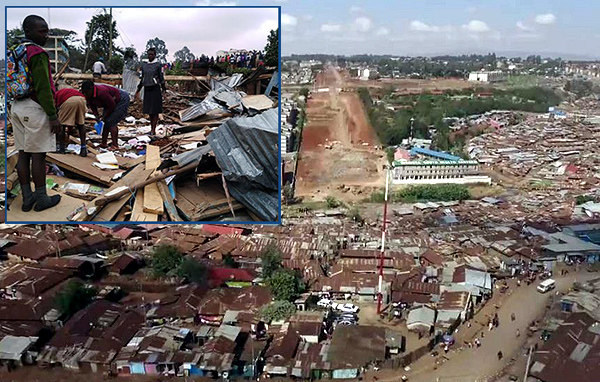 If this were a decade ago yesterday would have marked the start of another civil war in Kenya. But times have changed. The elite reign unbothered by humanity.
If this were a decade ago yesterday would have marked the start of another civil war in Kenya. But times have changed. The elite reign unbothered by humanity.
After the 2007 flawed election the 400,000 – 1½ million residents of Nairobi’s Kibera slum began violent protests that spread across the country like wildfire. Yesterday, bulldozers not ballot boxes plowed through their homes. Starting at 5 a.m. machines demolished tin huts, schools and health centers, and hundreds of police in riot gear pushed away old people and school children, and a modern world’s 200-foot super highway began to take form.
“Residents were… peacefully picking their belongings, with no signs of skirmishes.”
Only several years ago the international community and many of my readers went into action to a degree that was unbelievable to stop the “road through the Serengeti.” Who among you has protested the “road through Kibera?”
The road through the Serengeti would have displaced about the same fraction of a million animals that the road through Kibera displaces of humans.
Nairobi is a modern mushroom. It’s growing so fast that in the several months in between my visits the entire grid of highways and trains and airports changes. Skyscrapers rise on old fallen buildings before you can blink.
The economy is growing but not commensurate with this visible progress, and at some point I think that’s going to cause a serious problem. The infrastructure growth is largely financed by China. Based on Chinese history in such places as Sri Lanka, it doesn’t bode well several decades down the line.
But for the moment the average urban Kenyan is proud if not ecstatic. Except when she has to drive to work.
You dare not try to enter any part of the center city after about 6:30a or before 6:30p on any workday, and Saturday is becoming a workday. The 7-mile drive from the airport takes at least 2½ hours.
Recently I decided I had to experience it at least once. My first question was to John, my Uber driver. My Uber account was going to be debited about $10 for the UberX ride. John would get $8.
The normal $25 taxi fare that takes the main 7-mile highway into the city was not how we went. We doubled that distance going through an industrial area, then the tense suburb of Embakasi and via the Outer Ring Road, but we reduced the 180-minute ride to about an hour. I was impressed.
Even so, that meant John was earning $8/hour for his compensation and car. He made this work by constantly turning off the engine at the innumerable jams. That meant no a/c and it was hot and humid. Presumably for another $5 I could have had an UberSelect ride where this wouldn’t be necessary.
And many people won’t travel through Embakasi because that’s where the terrorists are supposed to be. Does UberSelect drive through terrorist areas?
My goodness, what the modern era means. And for the possibly tens of thousands of Kibera residents scattered to the wind?
They tried, and theoretically succeeded stopping the construction. Several court orders are active which interdict the government from bulldozing down the slum. But like all over the world, today, courts are simply being disregarded by those in power.
(Simultaneously yesterday in Nairobi, the SGR rail line began massive construction through Nairobi National Park despite a court order to desist.)
Spokespersons for Kibera are identifying themselves as “sacrificial lambs. “We have nothing against the road,” one leader told KTN-TV. They just want compensation.
Amnesty International negotiated a $100 compensation per person evicted, but how to determine who was evicted, whether half the residents who are below the age of 17 also get compensated, and scores of other issues means that no compensation was paid yesterday and likely none will.
So marches history through the impoverished lives of the less privileged. Where have our sensibilities gone? The gap is wide, today. It’s 200-feet wide in Kibera.